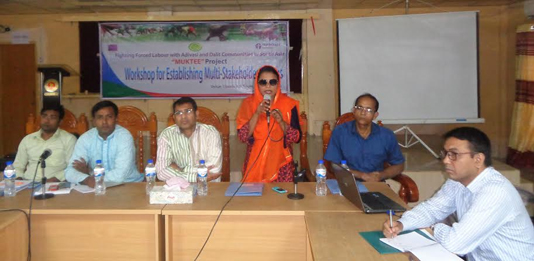RAJSHAHI, Aug 28, 2019 (BSS) – Mainstreaming of the ethnic minorities in high Barind area is quite possible through collaborative efforts of the government, said stakeholders at a participatory discussion today.
They mentioned adverse impact of climate change has been posing a serious threat to the living and livelihood condition of the marginalised population. So, concerted initiative has become indispensable to make them free from all sorts of climate-induced vulnerabilities including poverty and hunger.
They came up with the observations while addressing a workshop for establishing multi-stakeholders under a three-year project titled “Fighting Forced Labour with Adivasi and Dalit Communities in South Asia” at Tanore Upazila Parishad Hall Room in the district.
Agriculture Sustainable and Socio-economic Development Organization (ASSEDO), a national level voluntary development organization, is implementing the project with financial and technical supports of European Union and Tradecraft Exchange.
Chaired by ASSEDO Executive Director Rabiul Alam, the workshop was addressed, among others, by Upazila Vice-chairmen Sonia Sarder and Abu Bakker, Upazila Fisheries Officer Shahadul Islam, Agriculture Extension Officer Shaifullah Ahmed, Livestock Officer Ahsan Habib and Youth Development Officer Md. Sadikuzzaman.
The meeting was told that the project is being implemented in 30 villages under Tanore Upazila in Rajshahi and Nachole Upazila in Chapainawabganj districts for eliminating the menace of poverty.
Some 4,000 ethnic minority people including 2,000 women will be brought under various income-generating activities in Barind area for lifting them out of poverty.
To this end, 1000 of the enlisted people from 2000 households will be engaged in need-based training on various trades and vocations like electrics, mobile, mechanic, tailoring, computer operating, beautification, driving, carpentry and building construction.
The skill and capacity building activities will be implemented through participation of all stakeholders by December in 2021.



